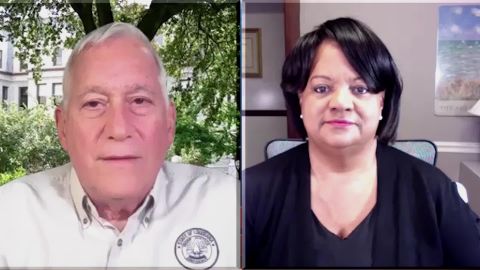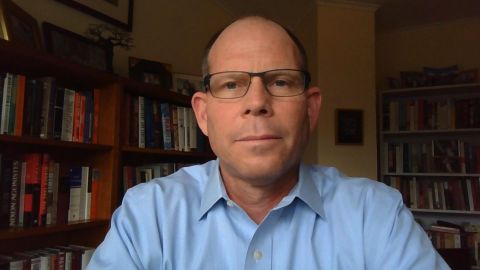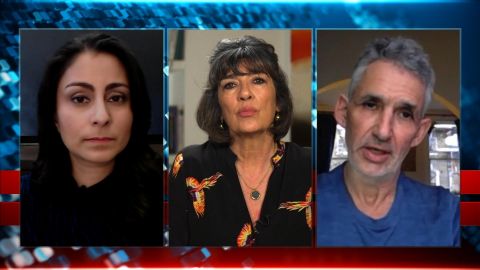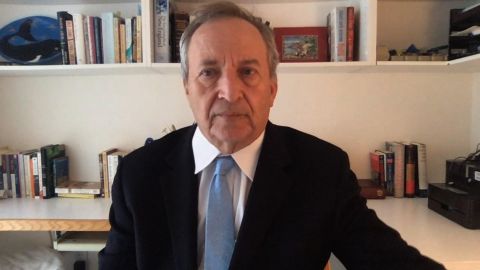Read Transcript EXPAND
WALTER ISAACSON: Dr. Regina Benjamin, thank you for joining us.
DR. REGINA BENJAMIN, BAYOUCLINIC: Thank you. Good to see you.
ISAACSON: We’re about to see the effect of this epidemic in rural America and what it’s going to do to the world health care system. You have run a clinic in Bayou La Batre, Alabama. You know the Gulf Coast area there. What are you seeing and what are you worried about?
BENJAMIN: My biggest worry is having people to take this very seriously. Most of the people are really embracing the social distancing, but you’re seeing pockets of people going to the beach, going to the plane. And, as my governor said, this is not time to have your friends over for supper. And you’re seeing that sort of thing. So that’s my biggest concern.
ISAACSON: Tell me about the Bayou La Batre clinic. It’s on the Gulf Coast of Alabama. You started it, worked on it for years. How’s it doing now? And how is it preparing for this crisis?
BENJAMIN: It’s doing fine. We’re seeing the challenges that everyone else is seeing. I have converted the clinic mostly now to the Gulf States Health Policy Research Center to start to look at some of the social determinants of health. We’re focusing more on trying to improve the entire health of the community and the entire health of the Gulf region, the states that border the Gulf of Mexico, Alabama, Mississippi, Louisiana, Texas, and Florida. We have the poorest health outcomes. And so we have been trying to find, why is that? We have to some of the best medical schools, the best doctors, and yet our health outcomes are poor. And when you put on top of that a disaster, as I call it, this pandemic, it stresses it even more. I look at this as a Category 4, now a Category 5 hurricane sitting in the middle of the Gulf of Mexico. And it’s not a matter of, will it hit landfall. It’s a matter of when and how hard.
ISAACSON: In the areas where you have worked, which is basically the Gulf Coast of Alabama and nearby areas, there’s not a whole lot of insurance and health coverage and security. What’s this going to do when it hits areas that are highly uninsured?
BENJAMIN: The uninsured is a big part of it. But even more so, we have got — in small towns, we have hospitals who have already been stressed. We’re seeing the critical access hospitals closing over the past several years. They’re going to be even more stressed. And they have been taking people who have — uninsured or underinsured. These folks are really vulnerable, because, when we talk about testing, are we having the testing available? Will there be charges? When we go to rural areas, for example, you see, in bigger cities, they will have drive-through testing. Many people in rural areas don’t have cars. And so how are we going to test people without a car? Are they going to get a ride with somebody else, which defeats the purpose? So, those are real concerns. And I hope that our government and our leaders are trying to make sure that we don’t be separated by economics, that our — your access to care doesn’t depend on your income or your pocketbook.
ISAACSON: This virus is particularly brutal to people with underlying conditions. Is there a political problem you face in the and rural areas of America, where there are greater numbers of these underlying conditions?
BENJAMIN: So, we’re — with the health disparities — we have been speaking a lot about health disparities over the past year, several years, to anybody who will listen, that we do have disparities in certain illnesses. Particularly in the African-American communities, we have more diabetes and more hypertension, strokes. And we’re seeing that this particular virus is particularly worse on people with underlying conditions. And so you’re seeing places like New Orleans, like Detroit, where we have a number of people with these underlying basic conditions, where, when they do come in the hospital, they come in sicker, and they’re getting sicker faster. And so we have to kind of start to pay attention to that. And, oftentimes, many of the folks normally could get by, and they’re getting by, but then you have got a history of high blood pressure or a history of diabetes. And some people may not even know they have high blood pressure or diabetes, and they come in much sicker.
ISAACSON: Do you have to deal with a lot of misinformation that has to be corrected?
BENJAMIN: I have to deal with misinformation all the time, things like how you can get the virus and how you can’t. There are myths out there like, if you hold your breath 10 seconds, you won’t get it — or if you can hold your breath a certain time, or if you — questions about — around food, for example. Do I wash my vegetables in Clorox? No, you don’t wash your vegetables in Clorox. And there are these types of myths that you see all the time. But keeping good information out there is really vital. That’s why I think it’s so important that we give good science, good factual information. People are hungry to know what to do and what’s safe and what’s not safe.
ISAACSON: When you’re talking to people in your community, what are they asking you?
BENJAMIN: Most people will say, what happens — how do I know if I’m starting to get sick? It’s allergy time. And we got all this pollen around. I’m sneezing. Am I getting sick? Should I go to the hospital? They’re practical kind of questions that everyone is seeming to ask. And, of course, those complicate things. We’re — I’m also getting questions about family members who have illnesses. Should the grandkids come and visit or, if we’re in the same house, can they come in the same room, those kind of questions. They’re very everyday, real questions that I’m getting. And it’s really — everyone’s different, how you respond. If your grandkids have been socially distancing for the last two weeks, then it’s probably OK for them. But if they have been out in the community and stuff, they may bring something back, and it’s not. And so those are the kind of questions I’m kind of getting.
ISAACSON: Are they afraid?
BENJAMIN: They’re scared. We all are scared. People are scared. The unknown is frightening. We’re hearing all these numbers and possibilities of infection and possibilities of death and probabilities of death. And they are real. These numbers are real. And so it’s going to be someone. It’s probably going to be someone we know or we love. And so that’s very, very frightening. And people are told to socially distance when you really need to be close together. So the mental health issues that — those concerns are real, and so we have to find ways to stay in touch, stay connected with those that we love, because you really need that emotional support right now, particularly when you’re fearful of the unknown.
ISAACSON: Are you hearing from people with mental health problems now? And what do you do to deal with the mental health problems that might be coming out of this?
BENJAMIN: So, the mental health infrastructure in our country has been weak anyway. We haven’t put enough resources. And almost every state has needs for more mental health services. Here in Alabama, we really, really need more services available. So it was very difficult to get people into mental health services before this. And now it’s going to be even harder, or it is harder already. There are different stages of mental health. There’s the severely mentally ill, which are afraid, paranoid, that — those are made even worse. But then there’s the other part, where it’s just simple depression, simple anxiety, simple fear. And those, we’re seeing as well. And those are just as real. We’re probably going to see more domestic violence, because we’re stressed. We see domestic violence increase during stress. We saw it during Katrina. People are together a lot more. And so how do we deal with those? And how do we let people know that this is a possibility, so we can prevent that from happening?
ISAACSON: This is not the first major crisis that the Gulf Coast has faced. Let’s discuss Katrina, which you and I remember well. What are the lessons we learned from Katrina, the hurricane, that might be applied to this situation?
BENJAMIN: There are a lot of lessons from Katrina. The first lesson, I would say is, right after Katrina, we learned that the federal government wasn’t going to come and rescue us right away. We had to roll our sleeves up and do for ourselves. A couple of weeks later, they did — or, I mean, some time, and they stepped in, but it takes time to ramp up. So we had to take care of ourselves. And so we did as a community. We also knew that it wasn’t, again, geographic boundaries. Katrina affected the entire Gulf Coast. And it wasn’t the counties or the state borders that it affected. It was all of us. We learned that the rebuilding took all of us together as well. And we put in a number of things around to get us ready for disaster planning. And that’s why I think we already know what some of these things to do. We have processes in place that we just have to activate. And some of the community, some of the mayors and county commissions are now activating them. It would be better if our states would activate them all at the same time, and that would help, because we have those. We did all that planning. So we learned from Katrina. We also learned from Katrina that we will get through it, and we will overcome it.
ISAACSON: What would you recommend in the future, if you were surgeon general or part of the public health corps again? What should we as a nation be learning from this and doing?
BENJAMIN: I think the public health infrastructure has to be solid and kept solid, and remember that the public health infrastructure is there. And that’s not just going to the doctor. That’s, do you have clean water? Do you have good sewage? Do you have clean food? Those things are part of public health, and you can’t weaken any one of those. And we need to strengthen every single one, because they all relate.
ISAACSON: I know you come from an incredibly strong family, and you have a very deep faith. How has that affected your way of looking at this pandemic and help tide you through this, as you look at the people in Bayou La Batre and other places that you have served?
BENJAMIN: We all have a sense that we should have a sense of duty, that we really should have a sense of taking care of each other, because we can look at what happened in Italy. And when I saw that the pope stopped mass, I don’t know if that’s ever been done in the history of Catholicism. Yet it was the right thing to do. And so we’re — as a world, we’re linked. And so our faith — I was kind of disappointed a little — not a little — a lot this weekend, when we had churches, bands going around picking up people to bring them to church, when we have asked people to socially distance themselves. We don’t have to be in a big mega-church to be able to pray. Prayer is personal. Your relationship with God can be personal. We don’t have to defy science, defy the instructions to be able to have a relationship with God. And I hope people know that. Many of the churches, there were places are having online services. They’re teaching us different ways to be faithful. And so that’s been very helpful for me to be able to call on my faith.
ISAACSON: Dr. Regina Benjamin, thank you for being with us this evening.
BENJAMIN: Thank you.
About This Episode EXPAND
Christiane speaks with former treasury secretary Lawrence Summers about the huge surge of unemployment claims; Tim Spector and Dr. Celine Gounder about the UK’s lack of COVID-19 testing; and Mark Suzman about how the Bill & Melinda Gates Foundation is helping to fight the pandemic. Walter Isaacson speaks with former U.S. Surgeon General Dr. Regina Benjamin about dealing with disaster.
LEARN MORE



